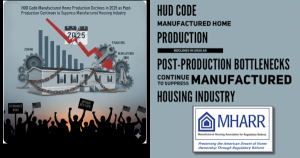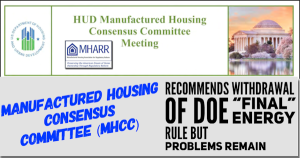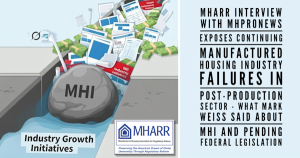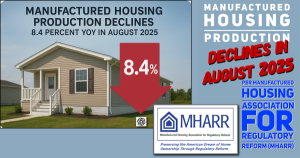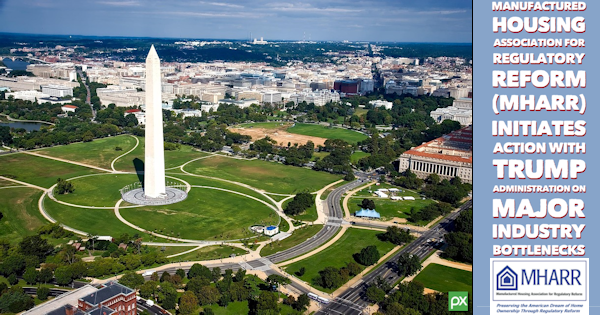
Washington, D.C., February 6, 2025 – As President Donald Trump’s second term begins, MHARR has been extremely active in communicating both with the President and his nominees to lead the U.S. Department of Housing and Urban Development (HUD) and the U.S. Department of Energy (DOE) to begin addressing and resolving the principal bottlenecks that have stymied the growth of the federally-regulated manufactured housing industry and have prevented the industry from reaching its maximum potential, while simultaneously imposing significant harm on American consumers of affordable housing. MHARR is pursuing this aggressive initiative based on three fundamental premises:
1. Manufactured housing must be – and must remain – federally-regulated pursuant to uniform standards, uniform enforcement and robust federal preemption which result in cost savings that are passed to homebuyers;
2. It is beyond dispute that today’s federally-regulated manufactured homes are the industry’s best homes ever, offering high quality and inherent affordability; and
3. The industry largely wasted its opportunity during the first Trump Administration to remove the three principal bottlenecks that have impaired the industry’s growth and expansion while simultaneously harming homebuyers.
Despite Congress’ enactment of outstanding laws designed to ensure the full parity of manufactured homes with all other types of single-family housing — i.e., the Manufactured Housing Improvement Act of 2000 (2000 Reform Law) and the “Duty to Serve” (DTS) provision of the Housing and Economic Recovery Act of 2008 (HERA) — and the unparalleled regulatory reform opportunities presented during President Trump’s first administration, the industry as a whole has failed to gain any significant traction in rectifying these bottlenecks, including specifically:
1. Forcing HUD to fully implement the enhanced federal preemption of the 2000 Reform Law to end the discriminatory zoning exclusion of HUD-regulated manufactured housing from entire communities;
2. Forcing Fannie Mae and Freddie Mac to serve the dominant manufactured housing personal property consumer financing market in accordance with DTS; and
3. Eliminating DOE’s draconian, destructive and discriminatory manufactured housing “energy conservation” standards.
Instead, the portion of the industry represented by the Manufactured Housing Institute (MHI), spent 2016-2020 pursuing speeches, exhibitions, displays and other public relations stunts that ultimately did nothing substantive to change the diminished status quo for the industry, which has consistently underperformed for nearly two decades notwithstanding a national affordable housing crisis. So much could have been accomplished over that period to put the industry back on track – but was lost to a wild goose chase of wasted opportunities.
Now, with a second Trump Administration assuming office, MHARR is taking no chances on a repeat of the industry failures of 2016-2020. Instead, MHARR has taken immediate action to fill the policy vacuum and take the lead with respect to the major regulatory bottlenecks that have suppressed the industry and its ability to fully serve the millions of American families in need of safe, decent and affordable non-subsidized housing and homeownership. Rather than cede market share to other types of construction, this effort is targeted at establishing mainstream HUD Code manufactured housing once and for all as the market-dominant, most affordable and most cost-efficient housing option over all other types and forms of factory-built housing.
In accordance with this overriding objective, MHARR has sent three communications (copies attached) to HUD Secretary-Designate (now confirmed HUD Secretary) Scott Turner and DOE Secretary-Designate (now confirmed DOE Secretary) Chris Wright.
Most significantly, in a January 30, 2025 communication to HUD Secretary Turner (Attachment 1), MHARR calls for HUD to federally preempt, under the enhanced federal preemption of the 2000 Reform Law, discriminatory zoning edicts that have unlawfully excluded HUD-regulated manufactured housing from far too many areas of the United States. Citing specific authority in the 2000 Reform Law, as contemporaneously confirmed in writing by key proponents of the 2000 Reform Law in the House of Representatives, MHARR maintains that such exclusionary zoning “requirements” undermine the core federal purposes of the 2000 Reform Law (including but not limited to ensuring the availability of federally regulated affordable manufactured housing for “all Americans”) and federal superintendence of the industry. MHARR, accordingly, calls for HUD to:
(1) Withdraw outdated 1997 preemption “guidance” which is inconsistent with the 2000 Reform Law;
(2) Initiate the development within the Manufactured Housing Consensus Committee (MHCC), of new preemption guidance that is consistent with the enhanced federal preemption of the 2000 Reform Law; and
(3) Most importantly, immediately begin to enforce that enhanced federal preemption against such discriminatory and exclusionary zoning edicts, including legal action if and when necessary.
In addition, MHARR’s communication calls for strong HUD action to remedy endemic mismanagement of the HUD manufactured housing program, including its unprecedented, destructive and inexcusable dependence on an entrenched “monitoring” contractor which has held a de facto sole-source contract for fifty years without any of the legal safeguards normally required for non-competitive federal contracts.
In another communication to HUD Secretary Turner dated January 22, 2025 (Attachment 2), MHARR calls for the revocation of last-minute (aka “midnight”) Biden Administration appointments to the statutory MHCC. Those appointments, announced just four days before the inauguration of President Trump, continue HUD’s tactic — since at least the Obama Administration — of undermining the independence of the MHCC by manipulating MHCC membership including, among other things, refusing collective MHCC representation for smaller, independent producers while consistently under-representing such producers. While the MHCC – a crucial, centerpiece reform of the 2000 Reform Law – was initially implemented by HUD in accordance with its full purpose and the express letter and intent of the 2000 Reform Law, successive HUD program administrators since that time have acted to subvert the full independence and representative nature of the MHCC in order to turn it into a subservient tool of the program, much like the failed Manufactured Housing Advisory Council, which it replaced. Insofar as members of the MHCC, by law, serve “at the pleasure” of the Secretary, MHARR’s communication calls on Secretary Turner to withdraw the “midnight” Biden Administration appointments and instead appoint new MHCC members that will restore the balance and full independence of that vital Committee.
MHARR’s third communication to both Secretary Turner and DOE Secretary Chris Wright, dated January 23, 2025 (Attachment 3), calls for a freeze on – and the withdrawal and revocation of –
1. DOE’s May 31, 2022 manufactured housing “energy conservation” standards rule;
2. DOE’s December 26, 2023 proposed manufactured housing “energy conservation” enforcement rule; and
3. Any HUD regulatory activity relating to such “energy conservation” standards or enforcement.
A freeze on regulatory activity pertaining to these actions is mandated by President Trump’s January 20, 2025 Executive Order pausing all action to propose, issue or implement any rule prior to review by the incoming administration. Moreover, the complete withdrawal and rejection of these actions by the Trump Administration is warranted insofar as both – as MHARR’s letter states – are “the product of junk science and radical environmental extremism, including the discredited … ‘Social Cost of Carbon’ construct, rather than sound and legitimate scientific bases.”
In the coming days and weeks, MHARR will aggressively follow-up on these communications and seek to ensure that President Trump’s second administration marks a significant turning point for the industry on these major issues. In addition, as activity progresses on the confirmation of a new Federal Housing Finance Agency (FHFA) Director, MHARR will initiate a similar dialogue regarding the Duty to Serve Underserved Markets (DTS) and the inexcusable, indefensible failure of both Fannie Mae and Freddie Mac to implement DTS for the dominant personal property lending sector of the manufactured housing consumer financing market.
In Washington, D.C., MHARR President and CEO, Mark Weiss, stated: “Despite the enormous opportunities that it presented, the first Trump Administration was largely wasted by the broader industry, which squandered resources on performative activities that failed to achieve substantive results. Instead of playing defense, a new Trump Administration presents a rare second chance for the industry to go on offense to eliminate the three main bottlenecks that have impeded its growth and harmed consumers. There will be no excuses for missing this rare opportunity. MHARR, therefore, encourages the entire manufactured housing industry to aggressively press for the removal of these bottlenecks now.”
The Manufactured Housing Association for Regulatory Reform is a Washington, D.C.- based national trade association representing the views and interests of independent producers of federally-regulated manufactured housing.
— 30 —
Manufactured Housing Association for Regulatory Reform (MHARR)
1331 Pennsylvania Ave N.W., Suite 512
Washington D.C. 20004
Phone: 202/783-4087
Fax: 202/783-4075
Email: MHARRDG@AOL.COM
Website: www.manufacturedhousingassociation.org

